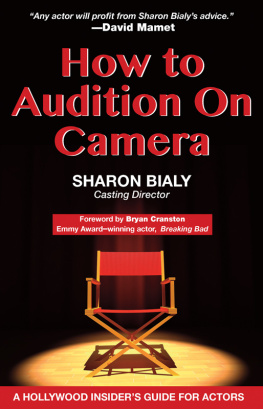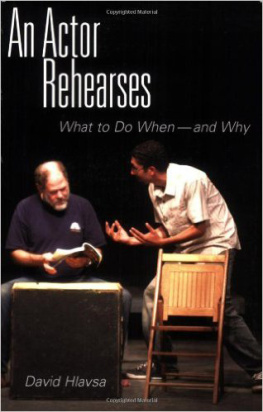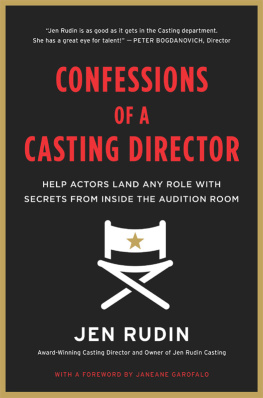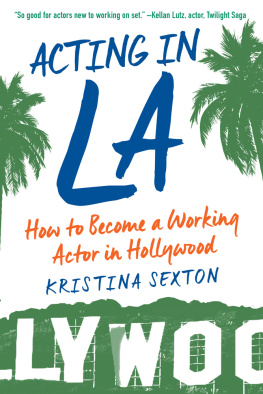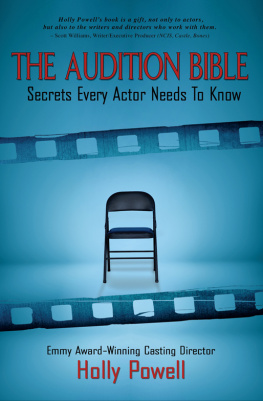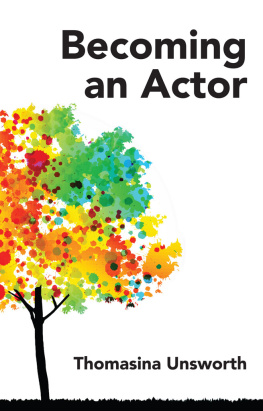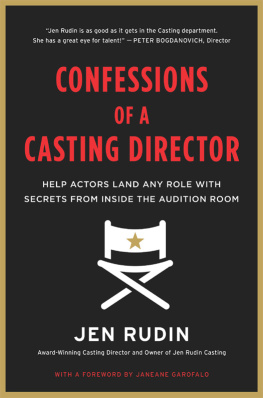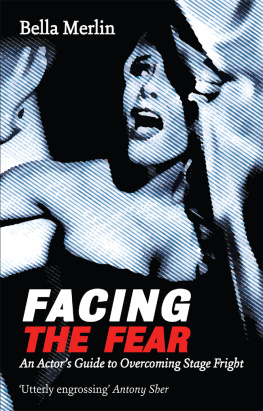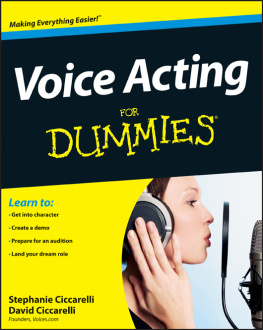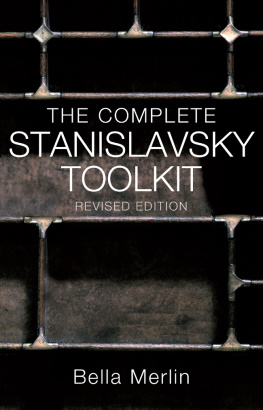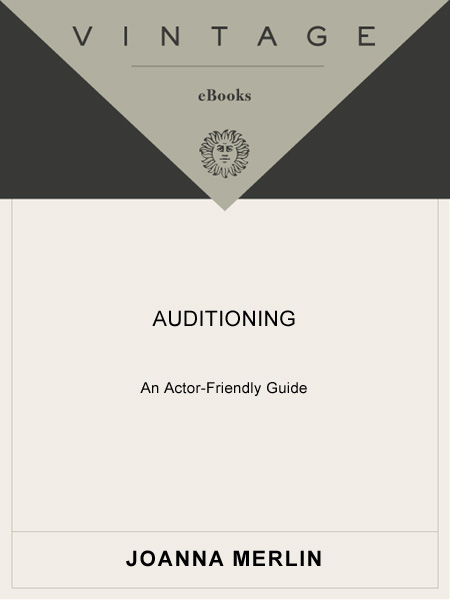
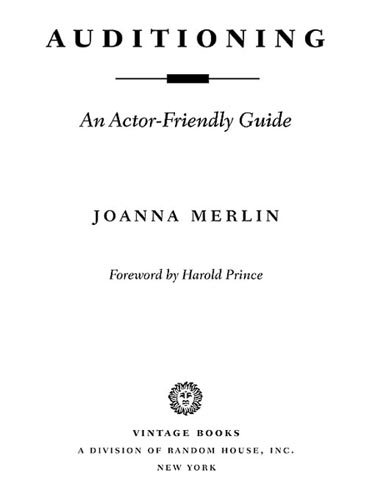
To Duff
Acknowledgments
To Michael Chekhov whose teaching and spirit continue to inspire me, to Hal Prince who had the crazy idea of hiring me as his casting director and changed my life, to Susan Smith, my agent and dear friend, to my students who taught me most of what I know, to Paul Libin who provided my first class, to Michael Miller who gave me a leg up, and to John David Wilder and Michael Jameson who made me promise to write it down a long time ago.
To my literary agent, George Nicholson, who took a chance on a first-time writer, to Diana Secker Larson, my supportive and unflappable editor, to Austin, Itamar, Margo, and Inger who were early readers, to the guest speakers in my Career Class at New York University who shared thoughts and ideas I may not have acknowledged in the text, and to the experts who contributed their insights and advice to Chapter X of this book.
And to my daughters, Julie and Rachel, who share their lives with me and fill me with unending joy and pride, to my mom who could have been a contender and was a life force for me from the beginning, to my sister, Harriet, whose love flows wide and deep, and to my divine grandsons, Noah and Jesse, who keep me young and happy, and to all the other friends, family, and colleagues who taught, encouraged, and supported me,
I extend my most grateful thanks.
Contents
Foreword
BY HAROLD PRINCE
In 1947, Marlon Brandos Stanley Kowalski exploded on Broadway and method acting had its superstar. At that time, George Abbott (for whom I would work barely a year later), extremely exasperated, called his resident casting director onto the carpet to complain that he had never seen Marlon Brandowhere had they hidden him? The casting director immediately went to his files and returned with a sheaf of audition dates on which Marlon Brando had been seen by Abbott, and rejected. Brando never considered himself a good auditioner, and that may explain the story. On the other hand, auditions at best are compromises. Good acting results from a process, a collaboration of actor and director and fellow actors and costume designers and wigmakers. Still, there has to be a way to cast a show, and unless the director has had previous experience with an actor, or wants from that actor a performance hes seen him give before, I dont know how you can avoid auditions.
Accepting that, Joanna Merlin has written a book based on her experience as both an actor and an esteemed casting director. I pride myself on first casting Joanna as a casting director. I met her when she played Tzeitel in the original production of Fiddler on the Roof, which I produced. We became friends, and I kept up with her appearances not only on stage but in film and on television. In those days, active producing organizations had their own in-house casting departments. I often had three musicals running in New York, and as many companies on the road, so that office adjunct was extremely busy. There were other producers as busy as I: David Merrick, Leland Hayward, Feuer and Martin, The Theater Guild, and Rodgers and Hammerstein. Each of them had a casting department of their own. But times were changing, and film companies began calling on the services of Broadway-based actors, so some of our best casting directors were lured away by bigger salaries and more glamorous assignments, which is how I came to lose one casting director and to be in the market for another.
I could have chosen from a number of experienced Broadway candidates. Instead, I decided to invent my own. But first I needed to define who that person would be, to appropriately reflect my feeling about actors. He (or she) should probably be an actor himself. He should know the New York scene. Not only the work pool, but where the most talented young people were studying, and who were the agents with taste. Someone who had networked in the community. Finally, perhaps most important, I wanted someone who loved actors. Strange as it may seem, there are just as many casting directors who dont as there are who do, and I suppose I understand that, given the exasperating circumstances surrounding employment in this business. And then, to top it all, I wanted a mother figure, so I guess he fast became she. Joanna Merlin fit all those criteria. Besides, she and her husband had two small babies, so, acting, with its rehearsals and tryouts on the road, was going to be difficult for her to accommodate. I called Joanna, proposed the ideaastonished her, I believeand she came to see me. The idea sat well, and it was the beginning of a busy decade for both of us, during which she was instrumental in introducing me to an astonishing array of talented people who have since found fame and fortune. Her taste is impeccable. In no instance can I remember her recommending anyone less than interesting for a role. When she finally moved on, it was to tackle such humongous assignments as spending a year traveling around the U.S. and the Far East casting Bertoluccis The Last Emperor. An impressive accomplishment. This book of hers is not the first guide to auditioning. But the last that I remember reading is almost a quarter of a century old. Times have changed.
Its no surprise that Joannas definition of the auditioning process would concur with mine. Her love for actors, her compassion, hasnt blinded her to their foibles. In this book she addresses their strengths and their insecurities, and she acknowledges thatartistry asidemaking theater is a job. A craft. Appropriately, she sets out to demystify not only the creative process, but, most particularly, the subject of this book: auditioning. Her style may be compassionate, but its all business, which is what a life in the theater must be.
Discipline. (Show up on time. Learn the lines.) Eschew all self-indulgence. There is no relationship between what you create and emotional anarchy. This book focuses on an actors priorities, explains intuition vis--vis preparation, strips away all the glamorous folderol that draws too many people to the theater. I think I knew most of what she is writing about, and probably agree with 90 percent of it. (A good percentage, believe me!) Best of all, with regard to actable choices, (Chapter III) I learned something Id never known. Somewhere in the body of the book, she lists 111 verbs as objectives. How damned smartpracticalof her!
Before I wrote this, Joanna invited me to suggest anything she may have overlooked; I cant. In fact, theres quite a lot that Ive overlooked over the years but, selfishly, hope that preparing auditioners take seriously. I do, however, have one comment. Its probable that what follows did not make its way into her book because, strictly speaking, it isnt about auditioning. Its about something larger: creating a career. I suspect, however, that if auditioning actors heeded what Im about to say, they and I would benefit.
It seems to me that a wider educational spectrum, greater inquisitiveness, more information, an enhanced vocabulary, and yes, extensive travelthe list is endlessare necessary props for an actor. Regrettably, too few people today respect the foundation that information and experience provide. Each successive year, the naturally brilliant young actors whom I see care less and less about the history of the theater, recognize fewer and fewer references to playwrights (who were contemporary in my youth), to actors, designers, theater companies, the history of this art form internationally. Everyone seems to know Stanislavsky, and certainly the Studio, but how many know Meyerhold, Piscator, the Eastern traditions of Kabuki and Noh?
Next page

